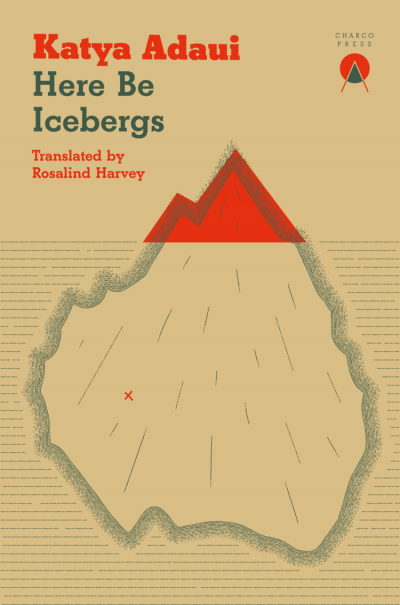The title of Katya Adaui’s debut collection in English is taken from one of the 12 short stories it contains: an allusion to the depths hidden below the surface, which is also one of the book’s central motifs.
Adaui is the Peruvian author of three books of short stories and a novel, who now lives in Buenos Aires. Here Be Icebergs, translated by Rosalind Harvey, is an elegant, slim volume, which, despite its size, manages to capture the enormity and complexity of familial and personal ties.
The opener, “The Hunger Angel”, is an excellent depiction of how we can merge into our family whilst simultaneously attempting to pull away from them. Written in short sections, counting back from 68 (a device that is unexplained), the narrative, as with most of the stories in this collection, is purposefully confused and disorientating. At times, it’s unclear who exactly is in this family, where they are, where they live, and if there are even still alive. This uncertainty, often accompanied by a sinister undertone, clouds most of the stories in Here Be Icebergs. The collection is also marked by Adaui’s manipulation of structure, as in “Alaska”, which begins its sections with place names, moving its subjects around the globe.
 Adaui is adept at making the reader feel uneasy – like there is something just beyond their grasp. There is a link between many of these stories which is never truly explained but is definitely there, sometimes passed directly from one story to the one that follows. A gun shows up multiple times (perhaps a nod to Chekhov’s comment that a loaded gun should only be placed on the stage if it’s going to go off), as do deaf children, waves, red hair, and seemingly, at times, the same family. The collection is bookended by this family (warring parents, dead paternal son, living son and living daughter), starting with “The Hunger Angel” and ending with “Seven Waves”, which sees all of the symbols of the book namechecked.
Adaui is adept at making the reader feel uneasy – like there is something just beyond their grasp. There is a link between many of these stories which is never truly explained but is definitely there, sometimes passed directly from one story to the one that follows. A gun shows up multiple times (perhaps a nod to Chekhov’s comment that a loaded gun should only be placed on the stage if it’s going to go off), as do deaf children, waves, red hair, and seemingly, at times, the same family. The collection is bookended by this family (warring parents, dead paternal son, living son and living daughter), starting with “The Hunger Angel” and ending with “Seven Waves”, which sees all of the symbols of the book namechecked.
Here Be Icebergs is elegantly poetic, playing as it does with repetition, structure, and at times almost dreamlike themes – mysterious fruit thieves in the night, a gardening politician confined to house arrest just outside an airport. Rosalind Harvey’s translation sensitively communicates this poeticism, giving the collection cohesion. The book ends with a charming Translator’s Note that examines the themes of the stories but also expresses Harvey’s personal connection to the stories and to Adaui’s native Lima.
Here Be Icebergs is a softly beguiling book, pulling the reader into its complexity and investigation of what are at times deeply vicious themes (the instances where the gun goes off; child abuse in “This is the Man”), but the horror is never too much that it becomes overwhelming. Instead, it offers a new way of seeing magic in the everyday, in the oddness of humankind and, as Harvey notes, in “the way we ceaselessly attempt contact despite all the evidence that each of us is an unknowable island”.
- Here Be Icebergs by Katya Adaui, tanslated by Rosalind Harvey (Charco Press, £9.99)
- More book reviews on theartsdesk















Add comment